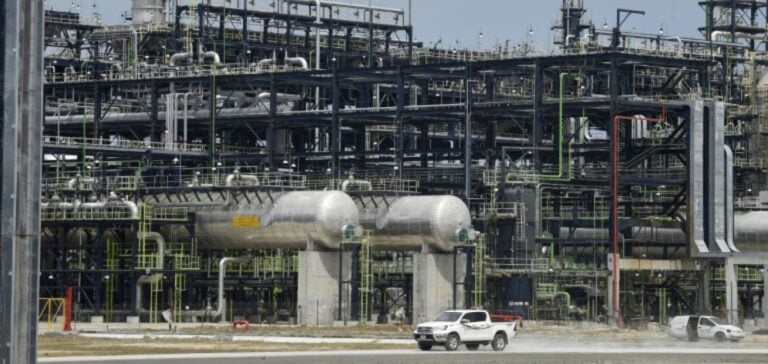Nigeria’s Dangote refinery, one of Africa’s largest oil refining facilities, recently announced its intention to export part of its gasoline production. This marks a shift in the refinery’s strategy, initially designed to meet domestic demand. Due to rising fuel prices and a declining local demand, the refinery is now forced to seek international buyers.
The Dangote refinery, with a capacity of 650,000 barrels per day, was intended to reduce Nigeria’s dependence on fuel imports. However, since gasoline production began in September, higher retail prices have made fuel unaffordable for local consumers, reducing demand. In October, pump prices increased nearly fivefold compared to the previous year, raising concerns about Nigerians’ ability to afford such costs.
First export attempt canceled
In early November, the refinery attempted its first export offering by issuing a tender for 40,000 tonnes of gasoline. However, this offer was quickly withdrawn due to local pressures. Industry sources suggest that the decision to retract the offer was driven by mixed public and regulatory reactions, as the Dangote project is seen as essential to ensuring Nigeria’s energy security.
Despite the cancellation, the refinery confirms it has the necessary stocks to begin exporting more than 200,000 tonnes of gasoline, with potential destinations in West Africa and the Caribbean, where commercial partners have shown interest.
Quality and fuel competitiveness
The refinery now produces fuel with a sulfur content below 50 parts per million (ppm), a significant improvement over the previous 500 ppm standards still common in Nigeria in 2023. This quality enhancement theoretically enables the refinery to compete with European imports and attract regional customers, notably Ghana, where standards are similar.
The West African market and some destinations in the Caribbean have been identified as potential outlets for this higher-quality gasoline. At African Energy Week, the CEO of Ghana’s National Petroleum Authority, Mustapha Abdul-Hamid, mentioned the possibility of importing fuel from the Dangote refinery, highlighting the potential cost savings compared to European supplies.
An uncertain future for the domestic market
With local gasoline production still far from meeting national demand, the Dangote refinery’s decision to turn to exports raises questions. The Nigerian state, through the national oil company NNPC, continues to import cheaper fuel, affecting Dangote’s competitiveness in its own market. The refinery has criticized these imports, claiming that lower-quality imported products are impacting its domestic sales.
Discussions are ongoing to establish long-term partnerships with Caribbean actors, as evidenced by recent meetings between Dangote Group and representatives of the Caribbean Community (CARICOM). These negotiations should allow Dangote to expand its business activities into regions where access to quality petroleum products is limited.
In sum, the Dangote refinery’s export strategy reflects a repositioning in response to the challenging Nigerian market, marked by rising prices and intense competition. Whether this strategy will provide economic stability for the company and satisfy investor expectations remains to be seen.





















